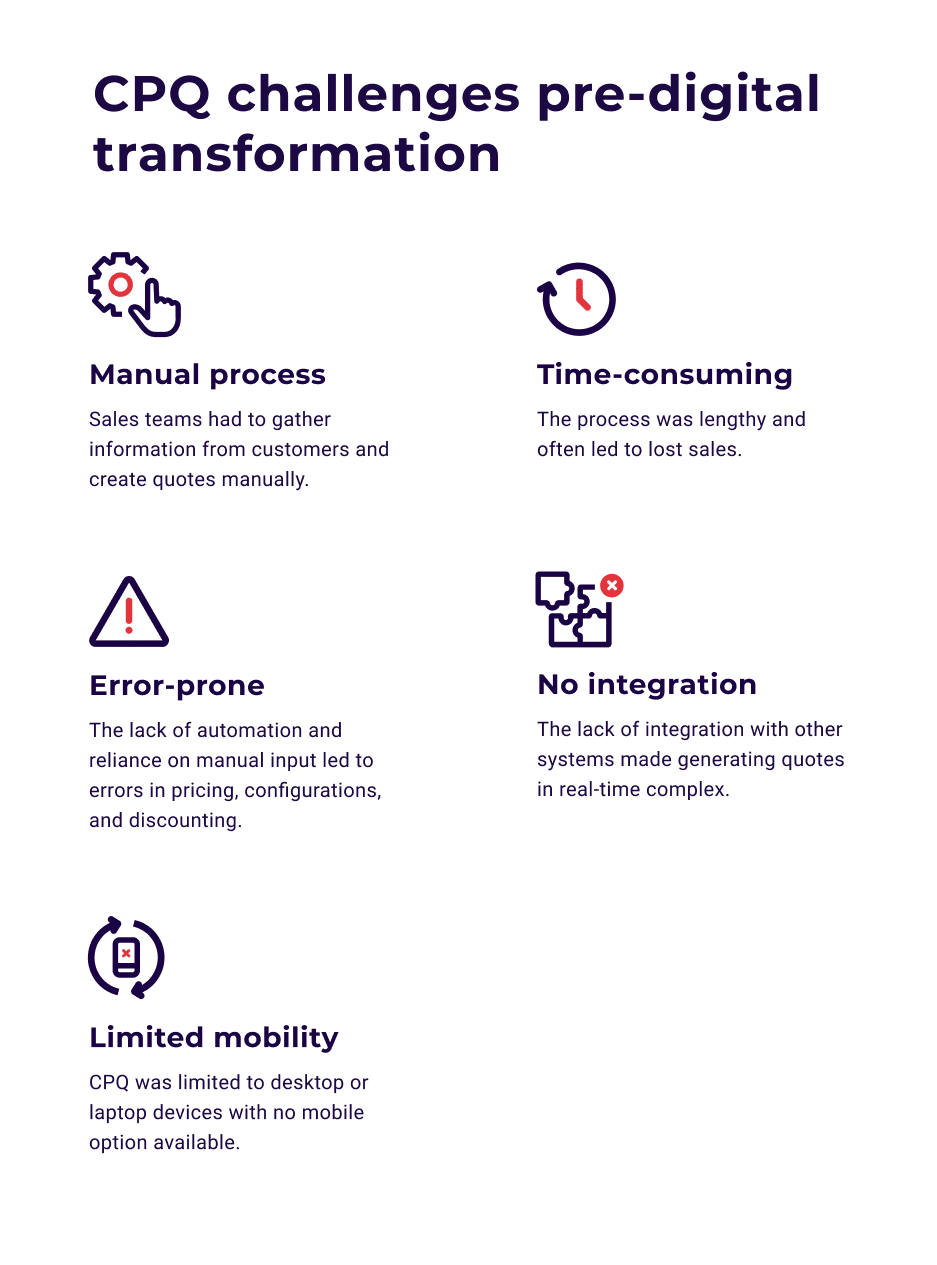As digital transformation continues to shape business operations, CPQ tools have become even more crucial. The advent of e-commerce, social media, and mobile technologies has revolutionized the way companies operate. To enhance your team and develop your 2023 game plan, staying updated on the latest strategies is vital. In this post, we will explore the evolution of CPQ in a post-digital transformation world and how it is shaping the future of sales.
Conquering business hurdles
Originally, CPQ was a manual process that relied on spreadsheets and human expertise to configure complex products and services while determining prices and generating customer quotes. But, that’s just the tip of the iceberg.
In the past, sales teams faced numerous challenges when generating quotes for customers. They had to manually gather customer information and then spend significant time inputting product and pricing details into spreadsheets or templates to create customized quotes. This manual process was not only time-consuming but also prone to errors, resulting in lost sales opportunities and decreased customer satisfaction. Sales professionals heavily relied on their product knowledge to create accurate quotes, often leading to pricing errors or missed cross-selling opportunities.
Moreover, the lack of automation and integration with other systems made it difficult to generate quotes in real time, hampering the overall efficiency of the sales process. Additionally, the limited availability of CPQ tools on desktop or laptop devices restricted sales teams from creating quotes on the go. These obstacles highlighted the need for a more streamlined and automated approach to quote generation.
The below illustrates some of the challenges facing CPQ before digital transformation:

The catalyst for change
Digital transformation emerged as a response to these business challenges, driven by the need for greater efficiency, automation, and enhanced customer experiences. Integrating digital technologies, data analytics, and automation became the foundation for revolutionizing CPQ solutions. Technological advancements, market demands, and the desire to stay competitive pushed businesses to rethink their sales processes.
The revolutionary impact of digital transformation on CPQ
In the era of digital transformation, businesses have undergone significant changes, and CPQ solutions have evolved to adapt to new challenges. Today, CPQ solutions like DealHub seamlessly integrate with applications such as CRM, marketing automation, and e-commerce platforms. This integration enables businesses to gather comprehensive customer insights and generate accurate pricing options. DealHub stands as a prime example of a CPQ solution that empowers businesses with advanced capabilities to streamline their sales processes and enhance customer engagement.
The advent of e-commerce has revolutionized the CPQ landscape too, redefining customer expectations in the purchasing process. CPQ tools have effectively responded to this shift by offering customers an intuitive online buying experience. Now, customers can conveniently configure products online and receive instant quotes, empowering them to make informed purchase decisions without the need for direct engagement with a salesperson. This seamless integration of CPQ with e-commerce platforms enhances customer autonomy and streamlines the overall purchasing experience.
CPQ tools have also adapted to the rise of mobile technologies. Sales professionals can now access CPQ tools on their mobile devices, allowing them to work from anywhere. This flexibility has made it easier for sales teams to collaborate with customers and reduce the quote-to-close journey.
Maximizing the benefits of CPQ in the modern business landscape
In a post-digital transformation world, CPQ has become an essential tool for sales teams looking to streamline their sales processes and increase productivity. Here is a list of some of those benefits that CPQ brings to the table:
CPQ solutions automate creating quotes, from configuring complex products to pricing and discounting. This leads to faster quote generation, which in turn results in shorter sales cycles and increased revenue.
CPQ solutions allow sales professionals to focus on selling rather than on time-consuming administrative tasks. This increases sales efficiency, as teams can spend more time connecting with customers and closing deals.
By automating the process, CPQ solutions eliminate errors and inconsistencies in pricing and configurations. This leads to improved accuracy, which reduces the risk of revenue loss due to incorrect pricing or configurations.
CPQ solutions provide real-time visibility into the sales pipeline, enabling sales managers to identify bottlenecks and adjust resources. This leads to enhanced visibility, improving the sales process’s overall efficiency.
CPQ solutions enable sales teams to collaborate more effectively by providing a centralized source of truth. This leads to better collaboration, which enhances the overall efficiency and effectiveness of the sales process. There are effective sales tools for team collaboration you can use.
CPQ solutions allow sales teams to tailor quotes and proposals to meet each customer’s needs. This leads to a personalized customer experience, which enhances customer satisfaction and increases the likelihood of closing deals.
CPQ solutions provide a range of benefits for sales teams in a post-digital transformation world. From faster quote generation to personalized customer experiences, CPQ solutions enable sales teams to streamline their sales processes and increase productivity.
CPQ trends to watch out
In the wake of digital transformation, the CPQ landscape is undergoing significant evolution in response to the growing needs of sales teams and customers. The latest CPQ trends, similar to those of the past, are centered around enhancing sales processes, optimizing efficiency, and delivering exceptional customer experiences with the aid of modern technology. Let’s explore some of the key trends shaping CPQ in a post-digital transformation world:
1. Artificial intelligence
The CPQ landscape is experiencing a transformative shift with the integration of artificial intelligence (AI). AI-powered CPQ solutions are revolutionizing the way sales teams operate, harnessing the power of customer data analysis, pattern identification, and intelligent decision-making. It’s through these AI-powered solutions that sales teams can personalize customer interactions, fostering greater engagement and boosting conversion rates. This newfound efficiency marks the significance of AI for sales, empowering sales teams to achieve unprecedented levels of success.
2. Augmented reality
With the advancements in Augmented Reality (AR) technology, the integration of AR into CPQ solutions is expected to reshape the sales landscape and elevate the customer experience to new heights. This exciting development will allow customers to experience products in immersive, real-world environments, providing them with a comprehensive understanding of the product’s appearance and functionality within their own space. By incorporating AR, CPQ solutions enhance the customer’s visualization capabilities, enabling them to make more informed purchasing decisions and fostering a deeper connection with the product.
3. Cloud-based CPQ
As businesses continue to embrace remote work models, the significance of cloud-based CPQs has significantly increased. These solutions offer unparalleled flexibility and scalability compared to traditional on-premise alternatives. Additionally, cloud-based CPQ solutions are not only more affordable but also provide a higher level of security, ensuring the protection of sensitive data.
4. Integration with CRM and ERP systems
Sales teams need access to customer data and inventory information to create accurate quotes and proposals. Integration with CRM and ERP systems enables sales teams to access this data in real-time, which leads to faster and more accurate quoting.
5. Increased personalization
With the demand for personalized experiences becoming the norm, CPQ solutions have stepped up to meet these expectations. Leveraging technologies, sales teams can now deliver offer highly personalized quotes and proposals that cater to the specific requirements of each individual customer. This level of personalization not only enhances the customer experience but also increases the likelihood of closing deals and building long-term relationships.
6. Voice activation
As voice assistants become more prevalent, we’re likely to see CPQ solutions incorporating voice activation technology. This will enable sales teams to generate quotes and access information hands-free, using voice commands to control the CPQ solution.
The bright future of CPQ
The future of CPQ is bright 
Looking to the future, CPQ will continue to evolve, embracing artificial intelligence, cloud-based solutions, and integration with emerging technologies. The future holds even more promise for increased efficiency, personalization, and transformative sales processes.
As businesses navigate the ever-changing digital transformation landscape, embracing CPQ solutions becomes crucial for maintaining a competitive edge and meeting customer expectations. The ability to streamline sales processes, generate accurate quotes, and deliver personalized experiences will be paramount in driving success.
Now, as you reflect on the journey of CPQ and its impact on sales processes, consider how your business can leverage these advancements. How can embracing CPQ solutions propel your organization forward in a post-digital transformation world? How will you leverage the power of automation, data analytics, and personalization to drive growth and exceed customer expectations?
The future of CPQ holds tremendous potential, and by embracing it, you can pave the way for unprecedented achievements in your business.









